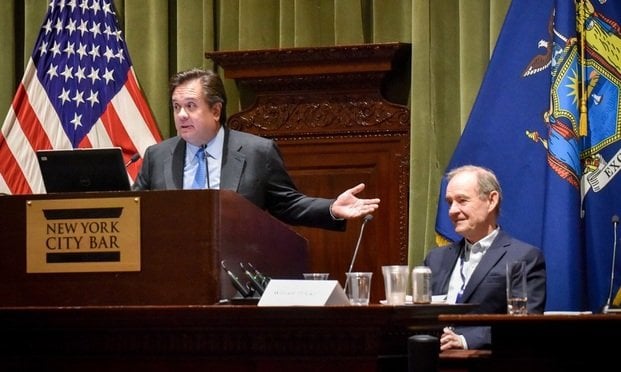Boies, Boutrous and Chemerinsky Back California's Squeeze on Trump's Tax Returns
"No other constitutional provision is implicated or violated by a state's requirement that a Presidential candidate disclose tax returns," David Boies said in a statement that was part of Gov. Newsom's press announcement.
July 30, 2019 at 04:30 PM
5 minute read
 Wachtell, Lipton, Rosen & Katz's George Conway introduces David Boies at a New York City Bar Association event. Credit: David Handschuh/ALM
Wachtell, Lipton, Rosen & Katz's George Conway introduces David Boies at a New York City Bar Association event. Credit: David Handschuh/ALM
Three legal veterans on Tuesday backed newly signed state legislation that would require President Donald Trump, and any other presidential candidate, to disclose their income tax returns in order to appear on California's 2020 ballot.
Boies Schiller Flexner chairman David Boies; Gibson, Dunn & Crutcher partner Theodore Boutrous Jr.; and UC Berkeley School of Law Dean Erwin Chemerinsky all supplied short opinions asserting the constitutionality of the new law in a media release from Gov. Gavin Newsom's office.
The new law “does not keep any candidate from being on the ballot so long as he or she complies with a simple requirement that is meant to provide California voters crucial information,” Chemerinsky wrote. “This is the state acting to make sure that its voters have information that might be very important to them when they cast their ballots as to who they want to be President of the United States.”
Jay Sekulow, a lawyer for Trump, said in a statement that “the State of California's attempt to circumvent the Constitution will be answered in court.”
Boutrous and Chemerinsky are outspoken critics of the Trump administration, writing and speaking regularly about what they and other observers contend are violations of norms and the rule of law. In January, Boies delivered a speech in New York in which he said Trump had made statements about federal judges that undermined the independence of the judiciary.
Chemerinsky told The Recorder he was contacted by a representative from the governor's office about opining on the constitutionality of the new state law. “I would gladly defend this law in court, though the state has its attorney general to do that,” Chemerinsky said.
Boies said the Constitution gives states authority to decide how their electors are chosen.
“No other constitutional provision is implicated or violated by a state's requirement that a Presidential candidate disclose tax returns,” Boies said in his statement. “Moreover, California, which permits electors to be chosen by popular vote, has an important interest in insuring that its voters are informed.”
He noted that the production of tax records can be part of some civil litigation, and obtaining a bank loan.
Boutrous, a Gibson, Dunn & Crutcher partner in Los Angeles and co-chairman of the firm's litigation group, pointed to the U.S. Court of Appeals for the Ninth Circuit's opinion this month in De La Fuente v. Padilla, which upheld a California state law requiring independent candidates to collect signatures from 1% of registered voters to appear on a statewide ballot.
“As the Ninth Circuit recently explained, such laws are constitutional if they are 'generally applicable, even-handed, [and] politically neutral,' and the state has an important justification for enacting the law,” Boutrous said in Newsom's press release. “Here, California's bill meets all of these requirements. It will apply to any candidate for President, whether Republican, Democrat, or Independent.”
The law, which requires five years of tax disclosures, also applies to future gubernatorial candidates. But the measure is clearly aimed at Trump, who has refused to make public his returns despite telling would-be voters in 2016 and beyond that he would “absolutely” release them. Trump claimed he could not release his tax returns because of an alleged IRS audit. But lawyers said even such an audit would not have barred disclosure.
“These are extraordinary times and states have a legal and moral duty to do everything in their power to ensure leaders seeking the highest offices meet minimal standards, and to restore public confidence,” Newsom said in a signing statement. “The disclosure required by this bill will shed light on conflicts of interest, self-dealing, or influence from domestic and foreign business interest.”
Then-Gov. Jerry Brown vetoed similar legislation two years ago. “Today we require tax returns, but what would be next?” Brown wrote in his veto message. “Five years of health records? A certified birth certificate? High school report cards? And will these requirements vary depending on which political party is in power?”
Trump recently sued New York and the House Ways and Means Committee to try to stop any release of his New York state tax returns. The suit, in Washington's federal trial court, challenges a new state law that permits New York authorities to disclose returns to the congressional committee.
Separately, the House Ways and Means Committee has sued the U.S. Treasury Department and IRS to obtain six years' worth of Trump federal tax returns. Federal law requires the IRS to furnish copies of federal returns on a request by the committee. Justice Department lawyers have failed to comply with the terms of a subpoena, and they argue the committee has no legislative purpose to obtain the records.
Read more:
This content has been archived. It is available through our partners, LexisNexis® and Bloomberg Law.
To view this content, please continue to their sites.
Not a Lexis Subscriber?
Subscribe Now
Not a Bloomberg Law Subscriber?
Subscribe Now
NOT FOR REPRINT
© 2025 ALM Global, LLC, All Rights Reserved. Request academic re-use from www.copyright.com. All other uses, submit a request to [email protected]. For more information visit Asset & Logo Licensing.
You Might Like
View All
'It's Not Going to Be Pretty': PayPal, Capital One Face Novel Class Actions Over 'Poaching' Commissions Owed Influencers

'Biggest Influencer Scam of All Time'?: PayPal Accused of Poaching Commissions Via Its 'Honey' Browser Extension


Trending Stories
- 15th Circuit Considers Challenge to Louisiana's Ten Commandments Law
- 2Crocs Accused of Padding Revenue With Channel-Stuffing HEYDUDE Shoes
- 3E-discovery Practitioners Are Racing to Adapt to Social Media’s Evolving Landscape
- 4The Law Firm Disrupted: For Office Policies, Big Law Has Its Ear to the Market, Not to Trump
- 5FTC Finalizes Child Online Privacy Rule Updates, But Ferguson Eyes Further Changes
Who Got The Work
J. Brugh Lower of Gibbons has entered an appearance for industrial equipment supplier Devco Corporation in a pending trademark infringement lawsuit. The suit, accusing the defendant of selling knock-off Graco products, was filed Dec. 18 in New Jersey District Court by Rivkin Radler on behalf of Graco Inc. and Graco Minnesota. The case, assigned to U.S. District Judge Zahid N. Quraishi, is 3:24-cv-11294, Graco Inc. et al v. Devco Corporation.
Who Got The Work
Rebecca Maller-Stein and Kent A. Yalowitz of Arnold & Porter Kaye Scholer have entered their appearances for Hanaco Venture Capital and its executives, Lior Prosor and David Frankel, in a pending securities lawsuit. The action, filed on Dec. 24 in New York Southern District Court by Zell, Aron & Co. on behalf of Goldeneye Advisors, accuses the defendants of negligently and fraudulently managing the plaintiff's $1 million investment. The case, assigned to U.S. District Judge Vernon S. Broderick, is 1:24-cv-09918, Goldeneye Advisors, LLC v. Hanaco Venture Capital, Ltd. et al.
Who Got The Work
Attorneys from A&O Shearman has stepped in as defense counsel for Toronto-Dominion Bank and other defendants in a pending securities class action. The suit, filed Dec. 11 in New York Southern District Court by Bleichmar Fonti & Auld, accuses the defendants of concealing the bank's 'pervasive' deficiencies in regards to its compliance with the Bank Secrecy Act and the quality of its anti-money laundering controls. The case, assigned to U.S. District Judge Arun Subramanian, is 1:24-cv-09445, Gonzalez v. The Toronto-Dominion Bank et al.
Who Got The Work
Crown Castle International, a Pennsylvania company providing shared communications infrastructure, has turned to Luke D. Wolf of Gordon Rees Scully Mansukhani to fend off a pending breach-of-contract lawsuit. The court action, filed Nov. 25 in Michigan Eastern District Court by Hooper Hathaway PC on behalf of The Town Residences LLC, accuses Crown Castle of failing to transfer approximately $30,000 in utility payments from T-Mobile in breach of a roof-top lease and assignment agreement. The case, assigned to U.S. District Judge Susan K. Declercq, is 2:24-cv-13131, The Town Residences LLC v. T-Mobile US, Inc. et al.
Who Got The Work
Wilfred P. Coronato and Daniel M. Schwartz of McCarter & English have stepped in as defense counsel to Electrolux Home Products Inc. in a pending product liability lawsuit. The court action, filed Nov. 26 in New York Eastern District Court by Poulos Lopiccolo PC and Nagel Rice LLP on behalf of David Stern, alleges that the defendant's refrigerators’ drawers and shelving repeatedly break and fall apart within months after purchase. The case, assigned to U.S. District Judge Joan M. Azrack, is 2:24-cv-08204, Stern v. Electrolux Home Products, Inc.
Featured Firms
Law Offices of Gary Martin Hays & Associates, P.C.
(470) 294-1674
Law Offices of Mark E. Salomone
(857) 444-6468
Smith & Hassler
(713) 739-1250






